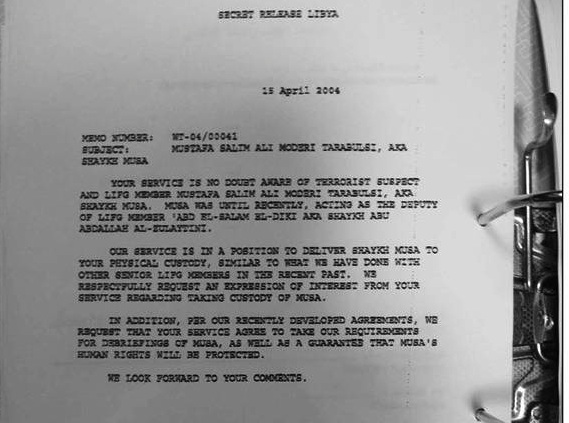By Al Russell and George Grant.

Tripoli, 6 September:
New allegations of torture and illegal rendition have been levelled at the United States . . .[restrict]and other countries by Libyans detained in the aftermath of the 11 September 2001 terrorist attacks.
The allegations are contained within a new report by Human Rights Watch, the New York-based NGO, and are based on interviews with 14 former detainees together with the so-called ‘Tripoli Documents’, files found in government buildings in the capital after the fall of the Qaddafi regime last year.
The report, ‘Delivered Into Enemy Hands: US-Led Abuse and Rendition of Opponents to Qaddafi’s Libya’, claims that 15 Libyans were subjected to extensive torture in US-run secret prisons, which allegedly included beatings, sexual humiliation, sleep-depravation and starvation.
Following their interrogations, all of the men were transferred back to Libya to face the prospect of imprisonment and – in many cases – further torture at the hands of the Qaddafi regime.
All of the 14 men interviewed were transferred back to Libya within 24 months of Qaddafi’s rapprochement with the West in 2004, symbolised by the famous ‘Deal in the Desert’, when British Prime Minister Tony Blair was greeted by Qaddafi in a Bedouin tent.
The report also alleges extensive collusion by the British intelligence services in both the rendition and interrogation of several of the detainees. One of those rendered back to Libya recounted how Qaddafi’s former spy chief Musa Kusa said to him: “Before 9/11, you went to countries where we couldn’t reach you. But now, after 9/11, I can just pick up the phone and call MI6 or the CIA”.
Three of the dissidents returned to Libya say they were subsequently interrogated by American, British, French and Italian intelligence officers in Qaddafi’s jails.
Most of those interviewed belonged to the Libyan Islamic Fighting Group, an anti-Qaddafi militant organisation established in the 1980s. Many had travelled to Afghanistan prior to the terrorist attacks of 11 September 2001, and some had come into contact with Al-Qaeda. However, the detainees denied being allied with Al-Qaeda against the West, insisting that they had fled to Afghanistan to avoid persecution at the hands of the Qaddafi regime.
In December 2004, however, nine months after the West brought Qaddafi in from the cold, the US State Department listed the LIFG as a terrorist organisation.
The report also documents how two of the detainees were subjected to waterboarding by the United States, the controversial interrogation-technique whereby water is poured over a person’s face to simulate drowning.
One of the two reportedly provided a credible account of waterboarding, whilst the second described a comparable account of water abuse.
The claim contradicts repeated assertions by the US authorities that only three detainees were ever subjected to waterboarding, none of them Libyans.
Asked about the new allegations of waterboarding, CIA spokeswoman Jennifer Youngblood said, “The agency has been on the record that there are three substantiated cases in which detainees were subjected to the waterboarding technique under the program.”
She said she could not comment on the “specific allegations” in the Human Rights Watch report but noted that the Justice Department had reviewed the treatment of more than 100 detainees held by the agency and “declined prosecution in every case.”
Other forms of prisoner-abuse detailed in the report include: “being chained to walls naked—sometimes while diapered—in pitch dark, windowless cells, for weeks or months at a time; being restrained in painful stress positions for long periods of time, being forced into cramped spaces; being beaten and slammed into walls; being kept inside for nearly five months without the ability to bathe; being denied food and being denied sleep by continuous, deafeningly loud Western music.”
The allegations contained within the report have once again called into question the decision of the United States and other Western governments to compromise on their commitment to human rights in the so-called ‘War on Terror’, including through enhanced security cooperation with the Qaddafi regime. [/restrict]






